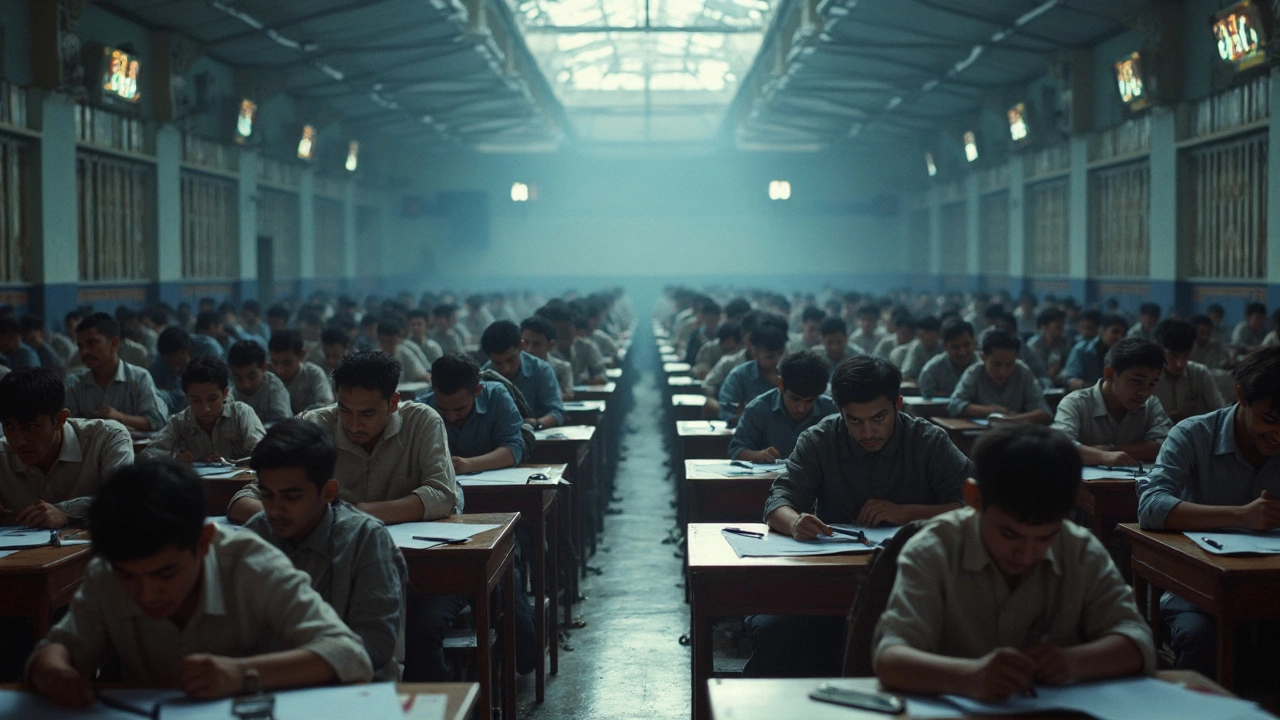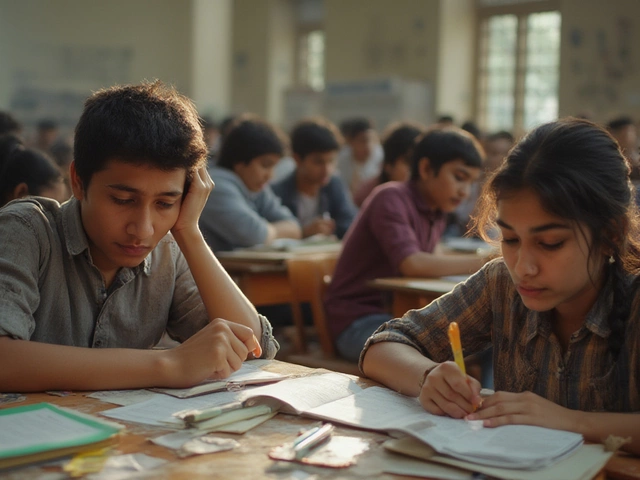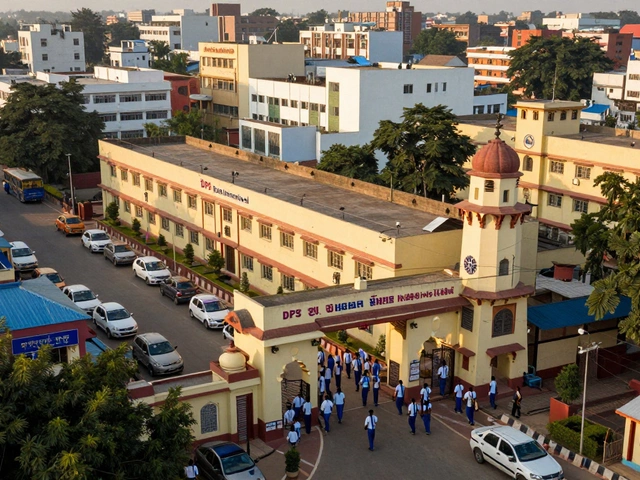Ever heard stories of exams so tough they give people nightmares? These aren’t wild rumors. Some tests around the world are infamous for crushing even the sharpest minds. If you imagine high-stakes exams with just a few questions, think again—these beasts often last for days, spit out questions from every angle, and only let a tiny sliver of people pass each year.
Why are these exams so feared? It’s not just about tricky questions. It’s about soaking up mountains of info, outsmarting fierce competition, and handling pressure that could make even the coolest person sweat buckets. Think you’ve taken tough tests before? Wait till you see just how wild it can get at the absolute top.
If you’re aiming for the top ranks or just curious to know what drives people to face these insane challenges, it’s worth looking at what really goes into the world’s No 1 toughest exam—and what you can learn from it. Let’s break it all down, from the brutal odds to survival tips that actually come in handy if you ever find yourself facing a mega-test.
- What Makes an Exam the ‘Toughest’?
- The Reigning Champion: Which Exam Tops the List
- Insane Competition: The Sheer Numbers
- Inside the Beast: What Does the Exam Test?
- Stories From Survivors: Real Test-Takers Speak
- Tips to Survive Super-Tough Exams
What Makes an Exam the ‘Toughest’?
So, what separates a regular hard test from the toughest exam in the world? It’s not just about getting a few tough questions wrong. There are a bunch of reasons why some exams build almost mythical reputations.
First up, the competition. When a test is called the hardest, it usually draws insane numbers of smart, dedicated people. We're talking millions trying for just a handful of spots. For example, the Gaokao in China has seen more than 11 million students take it in a single year, all fighting for university seats.
Next, the syllabus. These exams don’t pull punches. Expect to cover everything from academic theory to real-life problem solving. If you feel tired after studying for school finals, prepping for the world’s toughest exams can mean years’ worth of cramming and endless revisions.
Then there’s the pass rate. Brutally low. Some of these exams, like the UPSC in India, have a pass rate of less than 1%. And in Japan, getting into the University of Tokyo might look like climbing Everest due to its entrance exam rejection rate.
| Exam | Number of Candidates | Typical Pass Rate |
|---|---|---|
| Gaokao (China) | 11+ million | ~2% |
| UPSC (India) | 1 million+ | <1% |
| Bar Exam (USA, California) | ~9,200 | ~32% |
Let’s not forget about exam length and format. Some tests stretch over several days. The U.S. Medical Licensing Exam, for example, gets split into multiple-parts and drags on for over 21 hours in total. Some even throw practical challenges, interviews, or essays on top of standard paper questions.
- Scope covers wide subjects — math, reasoning, language, science, essays, and more.
- Multiple rounds — you might clear one phase, only to face the next, harder step.
- High mental pressure — many candidates just crack under the stress.
So when an exam is called the toughest, it’s about a mix of low pass rates, crazy competition, huge syllabus, weird formats, and intense stress. It’s not just about being smart; it’s about grit, strategy, and being able to handle serious pressure—all things you’ll find in the world’s most dreaded competitive exams.
The Reigning Champion: Which Exam Tops the List
Ask anyone who’s been in the toughest exam hunt, and one name jumps out: the Gaokao in China. This isn’t just a test; it’s often called the world’s hardest academic exam for good reason. Every June, millions of Chinese students take the National College Entrance Examination, hoping to score a seat at a top university. Sounds dramatic? That’s because it is—one mistake, and your academic fate can flip in a single day.
What makes the Gaokao the No 1 toughest exam in the world? It’s a mix of sky-high competition, sprawling subject lists, and life-altering consequences. Most students prep for years, facing 10-12 hour study days. On average, 11 million students sit the Gaokao each year, but only a tiny percent get into elite universities like Peking or Tsinghua.
| Gaokao Facts | Details |
|---|---|
| Annual Test-takers | ~11 million |
| Duration | ~9 hours over 2-3 days |
| Top University Acceptance Rate | <2% |
| Subjects | Chinese, Math, English, plus electives |
It’s not just about hard questions. The mental pressure is extreme. Families plan years around this exam. Stories aren’t rare where kids move cities or switch schools just for better Gaokao coaching. And it doesn’t just test math and grammar—it’s about speed, logic, writing skills, and how well you handle stress when everything’s on the line.
You might’ve heard about other brutal exams like India’s UPSC Civil Service or Japan’s University Entrance Exam. True, they’re tough. But the Gaokao takes the spotlight for its sheer numbers, massive syllabus, and the crazy weight it puts on students’ futures. If your goal is to find the world’s undisputed toughest exam, this is the one that tops the list again and again.
Insane Competition: The Sheer Numbers
Okay, let's get real about what makes the toughest exam in the world really brutal: the sheer number of people going after just a handful of success spots. Take the UPSC Civil Services Exam in India. Every year, around a million people fill out the application, but less than a thousand land the final job. Sounds unbelievable, right?
It’s not just about showing up, but beating insane competition. The actual pass rate hovers between 0.1% and 0.2%. That’s even lower than Ivy League admissions. But UPSC isn’t the only scary number game out there. For example, China’s Gaokao—another famous ‘killer’ exam—saw over 13 million students appear in 2024, with top universities only opening their doors to a tiny lucky fraction.
To put it into perspective, here’s a quick comparison of some of the world’s most competitive competitive exams:
| Exam | Applicants (Yearly) | Success Rate |
|---|---|---|
| UPSC (India) | 1,000,000+ | ~0.2% |
| Gaokao (China) | 13,000,000+ | 3% (to top schools) |
| All Souls Prize Fellowship (Oxford) | 80-100 | <2% |
| Bar Exam (USA, California) | 15,000+ | ~40% |
You don’t have to be a genius at math to see those odds are not in your favor. Most people taking these world hardest test challenges are well-prepared too—and the smaller the pass rate, the tougher it feels.
As one successful UPSC candidate put it:
“You’re not just fighting with others, you’re also battling your own self-doubt every single day. There’s no room for slacking.”
That kind of mental grind kicks in when you know millions are trying, and hardly anyone walks away with the prize. The sheer numbers make passing feel almost like winning a lottery, except luck alone isn’t enough here—you need grit and serious prep.
- Stay updated with exam trends. Sometimes the rules or format change, which can shake up the stats in a big way.
- Don’t just focus on how many compete—zero in on what makes the top scorers stand out. It’s usually consistency, smart planning, and mental stamina more than raw talent.
Keep these numbers in mind if you're thinking about going for the no 1 toughest exam—and remember, every single person in those stats once started off unsure too.

Inside the Beast: What Does the Exam Test?
The No 1 toughest exam in the world is the Gaokao, China’s national college entrance exam. This exam isn’t just about acing a few tough questions. It’s a full-on mental marathon that covers pretty much everything you learned in school—and then some. Here’s what people face when they sit for the infamous Gaokao:
- Chinese Language & Literature: Not just reading and writing, but analyzing poems, essays, and classical texts that go way beyond everyday schoolwork.
- Mathematics: Think calculus, advanced algebra, tricky geometry—problems so complex a calculator barely helps.
- Foreign Language: Most students pick English, but there are options for other languages. This isn’t just vocab drills; it’s grammar, reading comprehension, translation, and sometimes speaking tests.
- Extras: In some provinces, students need to tackle science (physics, chemistry, biology combos) or social science (history, politics, geography) depending on their track.
The Gaokao is famous for its time pressure. Test-takers face a two-day blitz of papers, with little room for rest or nerves. There’s no skipping questions or asking for clarification. And you get just one shot per year.
| Subject | Max Score | Main Areas Tested |
|---|---|---|
| Chinese | 150 | Reading, Writing, Classical Texts |
| Mathematics | 150 | Algebra, Geometry, Calculus |
| English (or other) | 150 | Reading, Grammar, Listening |
| Comprehensive (Sciences/Social) | 300 | Physics, Chemistry, Biology / History, Politics, Geography |
Cramming information isn’t enough. The questions push you to connect ideas, solve problems in new ways, and show you get the bigger picture. A student once said,
“Gaokao doesn’t just test what you know. It tests if you can think fast and hold it together under insane stress.”
If you’re aiming for the best universities in China, nothing gets left to chance. You’ve got to prove you can handle the hardest stuff–under real pressure. That’s what makes the Gaokao a real monster among competitive exams worldwide.
Stories From Survivors: Real Test-Takers Speak
If you want the real lowdown on the world’s toughest exam, just ask those who walked through the fire and (sometimes) made it to the other side. These aren’t actors in a commercial—these are people who prepped for years and spent nights staring at books or screens, pushing through burnout, and battling anxiety.
Amit, who cracked the Indian UPSC Civil Services exam (often argued to be the no 1 toughest exam out there), described his routine with brutal honesty: “I barely saw my friends for two years. My entire day was planned around revision and test series, with just one evening off a month.” The pass rate for this exam? Usually about 0.1%—that’s one out of every thousand people.
| Year | No. of Candidates | Final Selections | Success Rate |
|---|---|---|---|
| 2023 | 1,100,000 | 1,095 | 0.099% |
| 2024 | 1,150,000 | 1,057 | 0.092% |
Priya, who gave Japan’s National Center Test (a college entrance exam), shared her experience: “It’s not just about knowing the answers. It’s the pressure. I saw kids throw up in the hallway before walking in.” Sounds extreme? It’s a tough, make-or-break moment for millions.
Even outside India and Japan, stories trickle in from people taking the Chinese Gaokao. Chen, from Beijing, said, “My little brother and I both prepped for 12 hours a day, splitting up chores and even cutting out hobbies. It’s a family event, really.” The Gaokao is famous for its marathon sessions—sometimes nine hours over two or three days, with the future career of the teenage taker hanging in the balance.
- Exam prep often means no social life: Many test-takers spend a year or more locked into routines, with barely any breaks.
- Sleep? Rare luxury. Some survivors say they averaged five or six hours a night for months.
- Peer pressure isn’t just a phrase—in these competitive exams, everyone’s comparing practice scores constantly.
But here’s the kicker: Some who didn’t clear on the first try came back stronger. “You learn to bounce back,” says Raghav, who passed on his third attempt. If you’re gearing up for a monster exam, you’re in good company—and your story could end up inspiring the next round of survivors.
Tips to Survive Super-Tough Exams
No matter if you’re staring down the toughest exam in the world or just one that feels impossible, solid strategies make all the difference. It’s not about having a super-brain. It’s about building habits that keep you sane and sharp.
Here’s what works when you’re prepping for competitive exams that break most people:
- Make a study plan you can stick to. Don’t just list topics—set daily and weekly targets. Most toppers swear by breaking their prep into chunks. They use calendars, planners, or even apps like Notion or Google Calendar, so nothing slips through the cracks.
- Mix up your sources. Don’t stick to one book or one teacher. For the UPSC exam in India (which gets only about 0.2% candidates through the main stages), toppers use at least three sources for tough topics to cover every angle.
- Practice past years’ papers. For exams like the Gaokao in China or UPSC in India, old question papers or mock tests are pure gold. They show you exactly how tricky the real thing gets—and you’ll spot patterns most people miss.
- Time yourself—don’t just read passively. People who do well on world's hardest test often take full-length mock exams at home. If your exam takes 6 hours, sit and do the whole thing. This builds mental stamina and lets you spot silly mistakes before it counts.
- Join study groups, but keep them small. Some find them distracting, but the right group helps you see missed topics and keeps you motivated. For really brutal exams, it’s usually 3-4 people rather than a big classroom vibe.
- Schedule real breaks—don’t wing it. Cramming until 2 AM kills your focus. Most serious exam fighters use the Pomodoro Method (25 minutes hard work, 5-minute break) or set alarms to get up, stretch, and reset their brains.
- Watch your health. Insane as it sounds, exam success is about more than brains. Survivors from Japan’s National Bar Exam or South Korea’s Suneung say sleep, quick walks, and eating real meals gave them a clear edge.
If you like seeing facts in front of you, check out how top candidates spread their daily hours:
| Activity | Avg. Hours/Day (Top Candidates) |
|---|---|
| Focused Study | 6–8 |
| Mock Tests/Papers | 2 |
| Breaks & Walks | 1-2 |
| Review/Group Discussion | 1 |
But here’s the biggest tip—don’t try to do it perfectly. Everyone makes mistakes, has off days, and panics sometimes. The real winners in super-tough exams admit this, bounce back, and keep showing up, one day at a time.








